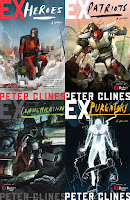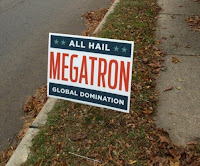Running a little late today, but still here. Thanks for waiting.
So, our title this week is one of those not-so-clever aphorisms that folks usually have to work through for a minute or two. I only mention it here because Shane Black used it in Iron Man 3… with the whole joke being that Tony Stark (cuffed to a bed frame at the time) didn’t get it.
In the interest of moving things along, the second mouse gets the cheese because the firstmouse set off the trap… and got killed. Now the trap’s harmless.
See what I mean. Obvious in retrospect, not so much when you first see it.
That’s what I wanted to blab on about. The traps that seem like good ideas at the time, for one reason or another, but later it’s clear they were the wrong choice.
Lots of aspiring writers fall into traps. Sometimes it happens when they follow
bad advice. Other times it’s because they insist on using a method or writing in a style
which really doesn’t work for them. And sometimes… sometimes that trap’s just sitting there in the tall grass, waiting to snap shut on someone’s leg.
We all want to think the traps are clear and easy to spot. But we’re all going to fall into a couple of them. That’s just life out here in the writing jungle. The trick’s to get out as quick as possible. Some folks, y’know, get caught in a trap and then try to convince themselves they wanted to be at the bottom of a hole with two wooden stakes rammed through their legs. Hell, everyone should be in a pit with two wooden stakes through their legs. It’s really the best position to be in.
None of us want to be that guy. Or to listen to that guy. Right?
So, with all that said, let me toss out some common—and maybe even dangerous—misconceptions people have about writing.
 Writing is easy –
Writing is easy – Probably the most common misconception there is. I mean, most of us learned how to put words on paper when we were ten, right? We could write passable essays by ninth grade. So writing for a living, for an audience greater than your immediate friends and loved ones, how hard could it be? Anyone can do it once you’ve got
a clever idea. Heck, I’d bet 90% of Americans have immediate access to a word processor of some sort.
Truth is, writing—not basic,
grade-school literacy, mind you, but the ability to
write— is a skill which needs to be learned like any other. All you need is to browse Twitter, Facebook, or the comment sections of any news feed to learn how
few people can express their ideas through words. Yeah, I took English and reading classes in school. But most of us went through twelve years of gym class, too, and we all understand that doesn’t qualify us to be in the Super Bowl.
Writers need to train and practice for months–maybe even years–before they’re ready to show off their writing. I don’t have hard numbers in front of me, but I feel safe saying Stephen King didn’t make much off the first 100,000 words he wrote. It’s work. Hard work. It requires skill, a great deal of practice, some actual talent, and a heck of a lot of dedication. That’s why so many people don’t succeed at it.
This is probably the most successful trap because it doesn’t just catch the writer–it tends to kill them 2/3 of the time. Most of the folks who believe that writing is easy have never actually written anything. They also tend to come up with a lot of reasons (unrelated, of course) for why they
never complete a manuscript.
First person is easy – A lot of prose writers start off with first person stories. It’s quick, it’s not hard to get into, it’s easy
to find a voice. It’s also very personable, so a reader can relate to my characters immediately. Plus there are tons of formats ready and waiting; journals, diaries, letter, memoirs, and so on. My first two published short stories were both first person.
Truth is, though,
first person is a very difficult, very limiting viewpoint to write in. There’s a reason lots of professional writers avoid it. It takes a lot of experience and planning to pull off a successful first person manuscript.
Writers who get caught in this trap start their first novel and pound out 20,000 words worth of journal entries over one weekend. There’s always that chance they may be brimming with so much raw talent they’re the next Hemingway or Steinbeck. Alas, there’s a far better chance, they’ve just wasted a long weekend.
Writing doesn’t require any writing – I think we’ve all heard or seen that person who talks about their brilliant story ideas, and usually follows it up with—“Well, I’ll write it out when someone’s willing to pay me.”
This mindset is a remnant of the huge spec script
boom in Hollywood a few decades back. It was one of those rare periods when studios acknowledged the importance of writers and were paying millions for
screenplays—or even just the idea for one. And that frenzy sold some books, too
However… this was almost thirty years ago. These days producers and publishers are much more cautious and they’re not interested in ideas. They’re interested in complete, finished works. Not two-thirds of a manuscript. Not most of a script.
Want easy proof of this? What do you think will happen if I self-published my idea? Not a complete manuscript, just my one-page, cool idea? How far do you think that’ll take me?
If not having a manuscript doesn’t work for self-publishing, it’s sure not going to fly in traditional publishing.
Just to save time,
knowing the right people won’t change this. No, it won’t. I don’t care what that website said. As a first-timer, I’m an unknown quantity. Who spends money on unknowns?
Not to sound too harsh but… well, no, this is harsh because people can only end up in this trap by choice. If someone can’t write and complete something, they can’t be a writer. That’s really all there is to it. I should stop now and go back to those criminal justice classes I thought about signing up for.
Writers don’t need to read – Somewhere along the line, some numbskull started pushing the idea that writers shouldn’t waste time reading—they should spend all their time writing. This is kind of like saying drivers shouldn’t waste their time stopping for gas.
Every professional writer I’ve ever met,
interviewed, or even just read about (myself included) reads voraciously. A writer should be devouring works in their chosen field to stay current and
snacking heavily on everything else to stay fresh.
Alas, the folks who fall into this trap tend to write plain awful stuff. Not from any inherent lack of talent—they just have no clue
what’s been done. They go for every easy idea, hit every cliché plot point, and tend to follow the textbook formulas they were taught in some creative writing class somewhere. What else can they do? They’ve had no other input. They end up trying to mimic one or two famous examples of what they aspire to… and usually end up looking just like the worst of the worst.
Research everything – This one’s more insidious than deadly, which is why I saved it for near the end. We all want to
get the facts right in our stories. We check books, make phone calls, visit locations… okay, yeah, and maybe some of us just spend a lot of time on Wikipedia. Point is, how can I be expected to
move forward with my story if I don’t know the exact month they started laying railroad track in Independence, Missouri? It’ll ruin everything if I say June and it turns out to be July.
This is an awful trap because getting stuck in it means I’m trying to do the right thing. Research is important, but I can’t ever forget that research isn’t writing. There’s a time for putting noses in books but there’s also a time for putting fingers to keyboard (or pen to paper if you’re old-fashioned).
Some folks get caught in an even deeper layer of this trap. They get stuck researching how to write. We’ve all known someone like this, yes? The one who buys books, takes classes, studies YouTube tutorials… but never does any actual writing.
For some people this becomes a defense mechanism of sorts, sometimes subconsciously and sometimes… not so subconsciously. If I never start, I won’t have to put the work in, and my work stays in that wonderful hypothetical stage where it’ll be the greatest thing ever committed to paper… if only I had time to write it down.
Rewrite until it’s perfect– The last and deadliest of the traps in our showroom. For some folks, rewriting turns into an endless loop. There’s always another opinion to listen to, more feedback to get, and revisions which need to be done because of them. Just thought of a new way to do those action scenes? That calls for
another draft. Maybe last night’s
Agents of SHIELDinspired a new opening? Perhaps my old college beau is visiting and s/he thought the ending needed
a touch more romance, and any decent writer knows
changing the end means changing everything that leads up to the end.
There are two ways people fall into this trap. One is a combination of bad advice and bad judgment. So many gurus tell people to rewrite and rewrite and rewrite. How many times have you heard “writing is rewriting” parroted in classes or on message boards? There’s some truth to that, yeah, but eventually, a writer
just needs to call it done and move on or they’re going to be trapped in one manuscript forever.
The other way people fall into this trap is on purpose. A bit like with research, constant rewrites are an excuse not to actually produce anything. You don’t expect me to show you an incomplete or old draft, do you? I was going to send it to some agents or publishers, but I think it needs one more polish to make it perfect. Maybe one more after I go through and clean up a few loose threads. Rewrites are a way some writers–again, consciously or not– can avoid possible failure yet still keep up the illusion of forward motion.
Are all of these traps deadly? No, but getting snagged in one can definitely cost me some time. Yeah, I’ve fallen into one or three of them over the years. Fortunately, one of those things only has to slam on your ankle once and you’ll rarely let it happen again.
Next time, I’d like to talk with you real quick about my buddy Marc, who I was stationed with in Kuwait six years ago…
Until then, go write.
And watch your step.
 And there was this blog. A record breaking seventy-six posts this year but… let’s be honest. At least a dozen of those were just Tom Gauld cartoons or memes, and maybe another dozen were random promo posts for Paradox Bound or the Dead Men Can’t Complain collection. Still, that means these were around fifty rants on one topic or another. I think I could call this year a tie with 2009, previously the most successful year of the ranty blog.
And there was this blog. A record breaking seventy-six posts this year but… let’s be honest. At least a dozen of those were just Tom Gauld cartoons or memes, and maybe another dozen were random promo posts for Paradox Bound or the Dead Men Can’t Complain collection. Still, that means these were around fifty rants on one topic or another. I think I could call this year a tie with 2009, previously the most successful year of the ranty blog.









